![]()
No single act does more to connect us to one another, and even to make us human, than communication. From our first babbles to our final words, the language we speak to one another shares our ideas, feelings, and needs, allowing us to grow and thrive. And hearing the ideas, feelings, and needs of others is equally essential to life. And while some of us may need to use devises and mediums like hearing aids, sign language, or assistive devices to communicate, hearing and being heard is fundamental.
That’s why communication disorders are so serious, and why the services of a Speech, Language, and Hearing professionals are so important. Speech, Language, and Hearing professionals like audiologists and speech therapists can help those suffering from problems including hearing loss, speech fluency, language processing, as well as conditions associated with the speaking and hearing mechanisms, such as poor balance or difficulty swallowing.

A career as an audiologist or speech pathologist starts with a foundational undergraduate degree in Communication Sciences and Disorders or Speech, Language, and Hearing Sciences, followed by a graduate degree, licensure, and optional national credentials. These professionals enjoy strong salaries and a great job market, and the personal rewards of working in a helping profession. To understand the speech, language, and hearing field, education requirements, credentials, and profession, read on.
Jump To:
-
- What is Speech, Language, and Hearing Sciences?
- What Types of Speech, Language, and Hearing Sciences are There?
- What is a Speech, Language, and Hearing Sciences Degree?
- What Classes Will I take for a Speech, Language, and Hearing Sciences Degree?
- What Can I do with a Bachelor’s in Speech, Language, and Hearing Sciences?
- How do I Become a Speech Pathologist?
- How do I Become an Audiologist?
- Can I Earn a Degree in Speech, Language, and Hearing Sciences Online?
- What Jobs Can I Get with a Degree in Speech, Language, and Hearing Sciences?
- How Much Can I Earn with a Degree in Speech, Language, and Hearing Sciences?
- What is the Job Market for a Degree in Speech, Language, and Hearing Science?
- Is a Degree in Speech, Language, and Hearing Sciences Right for Me?
What is Speech, Language, and Hearing Science?
Simply put, speech, language, and hearing science (SLHS) is all about communication, both receptive and expressive. SLHS is focused on the bodily functions that allow us to hear and speak. This includes how our hearing and speech systems work, problems they may present, and how they can be treated. Speech, language, and hearing science researchers and practitioners focus on strategies for identifying, reducing, treating, and preventing impairments in communication. This requires a deep understanding of the cognitive, physiological, developmental, neurological, and practical aspects of human communication. The field of Speech, Language, and Hearing Sciences is also sometimes referred to as Communication Sciences and Disorders.
A few of the topics encompassed by speech, language, and hearing science include:
- how the brain processes sound and speech
- how the ear functions
- how abnormalities in the mouth and throat may impact speech patterns
- how verbal exercises can improve speech impairments
- how assistive devices and technology can facilitate communication
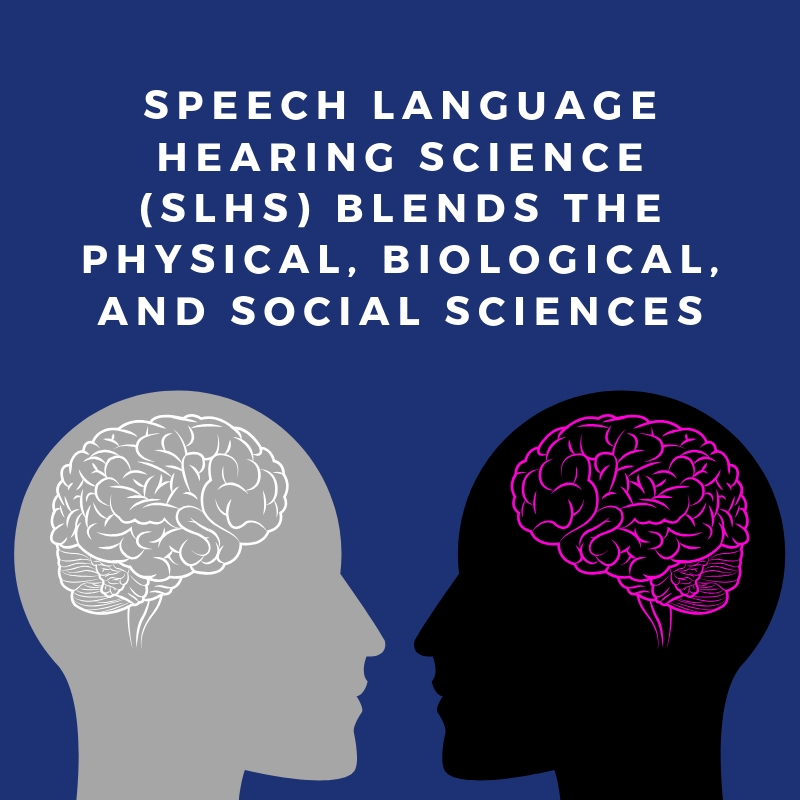
Speech, Language, and Hearing Science can also encompass issues beyond pure communication sciences. Speech, Language, and Hearing Science programs also cover big-picture topics like the relationship between language and society, how different groups communicate, and the impact of communication disorders on individuals and society.
Speech, language, and hearing scientists need to have a grasp of several disciplines: the physical, the biological, and the social. Speech, Language, and Hearing Scientists have an understanding of how the mechanics of speech and hearing operate, how the body’s systems support these functions and process communication input and output, and how communication matters to individuals and society.
What Types of Speech, Language, and Hearing Science are There?
As we’ve seen, many different topics in the realm of communication relate to Speech, Language, and Hearing Science. Generally, these fall into two professional fields: audiology and speech-language pathology. Both fields are considered allied health professions, fields of healthcare outside of nursing, medicine, and pharmacy, such as optometry, occupational therapy, physical therapy, and clinical psychology.
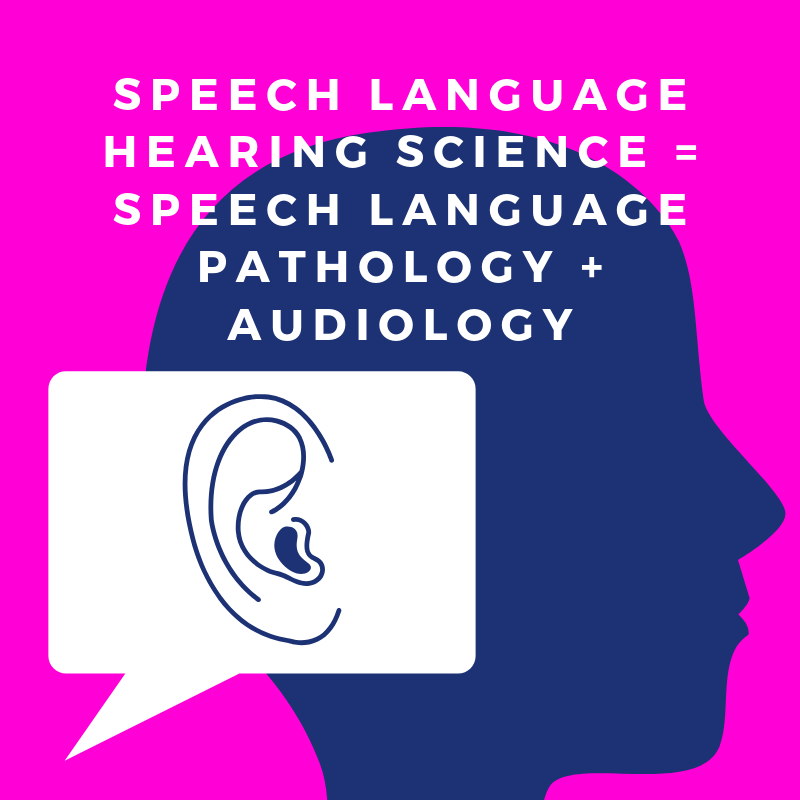
Speech-Language pathology is the study of problems with speaking and swallowing, usually caused by conditions like autism, developmental delays, brain injury, stroke, hearing loss, Parkinson’s, cleft palate, or injuries to the mouth and throat.
The National Institute on Deafness and Other Communication Disorders reports that almost 1 child in 12 in the United States has experienced a disorder with voice, speech, language, or swallowing in the past year. The Center for Disease Control finds that, of these, speech problems are the most common condition among children, and that about 33% have a problem with more than one of these areas (usually as both speech and language problems). Adults also have the need for speech therapy, especially older adults, who are more likely to experience problems with swallowing and speaking due to Parkinson’s, stroke, or age-related hearing loss.
Speech-language pathologists, also called speech therapists, help people with disorders of speech, language, and swallowing through speech therapy. They address these challenges by assessing a patient’s needs, creating treatment plans, and performing interventions such as training them how to produce certain sounds or teaching them to use assistive communication devices.
Audiology is the study of hearing and balance, including the diagnosis, management, and treatment of hearing problems.
According to the World Health Organization (WHO), as many as 466 million people globally have disabling hearing loss. Less severe, but still problematic hearing problems are also prevalent. Research by the Hearing Loss Association of America has found that 48 million Americans or 20% of the population has some degree of hearing loss. This problem doesn’t just affect people’s relationships and personal lives. Hearing loss has a significant economic cost as well; the WHO estimates that unaddressed hearing loss robs the global economy of $750 billion every year.
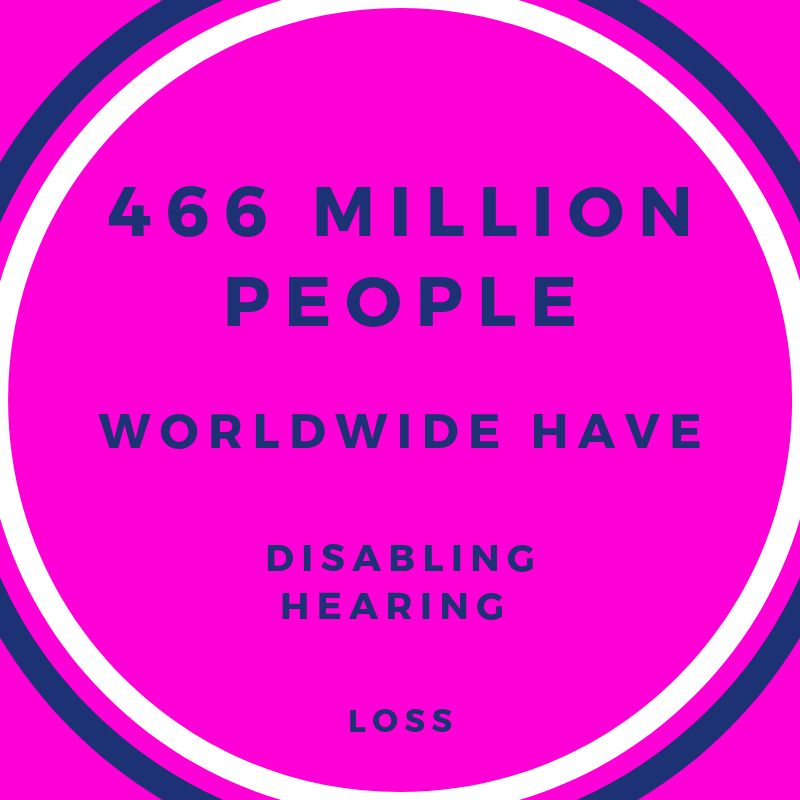
Audiologists assess and treat hearing problems and related disorders, such as inner ear conditions that lead to problems with balance. Common interventions performed by audiologists include assessing a person’s range of hearing, fitting patients for hearing aids, and performing auditory training. Some audiologists perform research into the underlying causes of hearing problems or look for new treatments.
What is a Degree in Speech, Language, and Hearing Sciences?
Many students interested in communication follow pursue a degree in the multidisciplinary field of speech, language, and hearing science. A degree in Speech, Language, and Hearing Sciences is a professional degree, designed to train students for a career in an allied health profession helping those with communication disorders. A bachelor’s in Speech, Language, and Hearing Sciences equips students with a comprehensive foundation in the function of the hearing, language, and speech systems, along with common disorders and their treatments. Advanced degrees in related fields are required for careers in clinical audiology and speech therapy. PhDs in Speech, Language, and Hearing Sciences are also offered by some schools; these are geared towards those interested in academic research and instruction.
Students interested in pursuing a degree in Speech, Language, and Hearing Science should look for a Speech, Language, and Hearing program that has been accredited by the Council on Academic Accreditation in Audiology and Speech-Language Pathology (CAA). The CCA is the accreditation branch of the American Speech-Language-Hearing Association, and sets high standards for educational rigor. In order to become a credentialed audiologist or speech-language pathologist, you will need to show that you’ve graduated from a CCA-accredited school.
What Classes Will I take for a Degree in Speech, Language, and Hearing Sciences?
Every school’s curriculum is unique, but most Speech, Language, and Hearing Science degrees cover the same basic topics, with a clinical focus on communication rounded out with classes in research methods, linguistics, and other related topics. Courses tend to use case studies extensively, so students can gain an understanding of how speech, language, and hearing development and problems play out in real life.
Typical class titles in a Speech, Language, and Hearing Science degree program include:
- The Physics and Biology of Spoken Language
- Language and the Brain
- Communication Differences and Disorders
- Assessment and Treatment in Speech-Language Pathology
- Hearing Measurement and Disorders
- Anatomy of the Speech and Hearing Mechanisms
- Health and Disability Across the Lifespan
- Speech Science
- Hearing Science
- Language Acquisition and Science
- Phonetics
- Rehabilitative Audiology
- Neuroscience of Human Communication
- Aural Rehabilitation
- Phonological Disorders
- Capstone Project in Speech-Language-Hearing Sciences
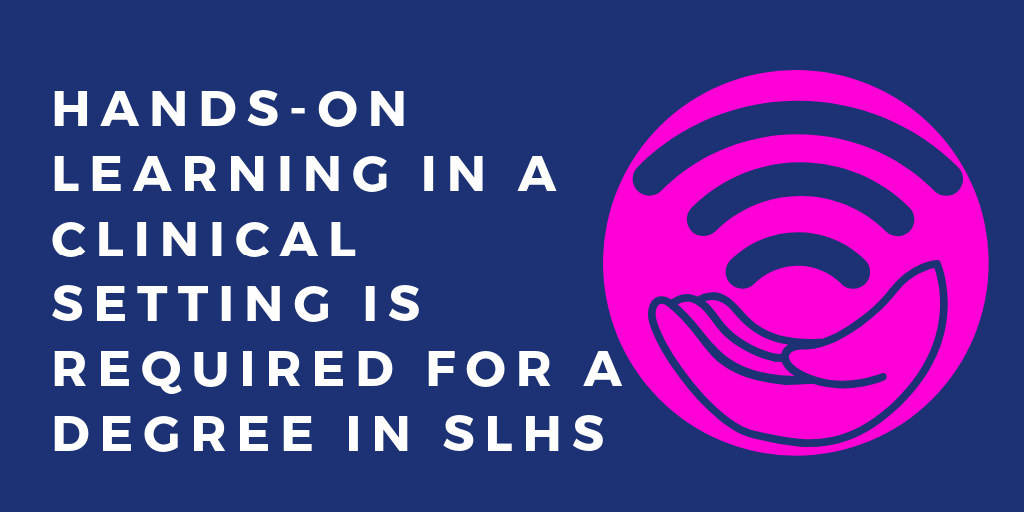
In addition to the science and clinical treatment of communication disorders, most degree programs in Speech, Language, and Hearing Science cover the human experience of communication in some form, either through the study of linguistics, sociology, or psychology. This background is essential for future clinicians to understand the impact of communication challenges for individuals, communities, and societies in their practice. Hands-on experience is another important piece of a Speech, Language, and Hearing Science degree program. Students pursuing a Speech, Language, and Hearing Science degree will be required to complete an internship, practicum, or other field experience where they can get real-world experience in treating communication disorders, and learn through both observation and supervised practice.
What Can I do with a Bachelor’s in Speech, Language, and Hearing Sciences?
A bachelor’s in Speech, Language, and Hearing Sciences may be offered as either a Bachelor of Arts (BA) or Bachelor of Science (BS). A BA includes extensive general education requirements, and is designed to produce a well-rounded critical thinker. A BS is a focused degree, and is designed to produce a trained specialist. Both BA and BS programs sometimes also offer additional concentrations in the field of Speech, Language and Hearing, such as Childhood Communication or Aural Sciences.
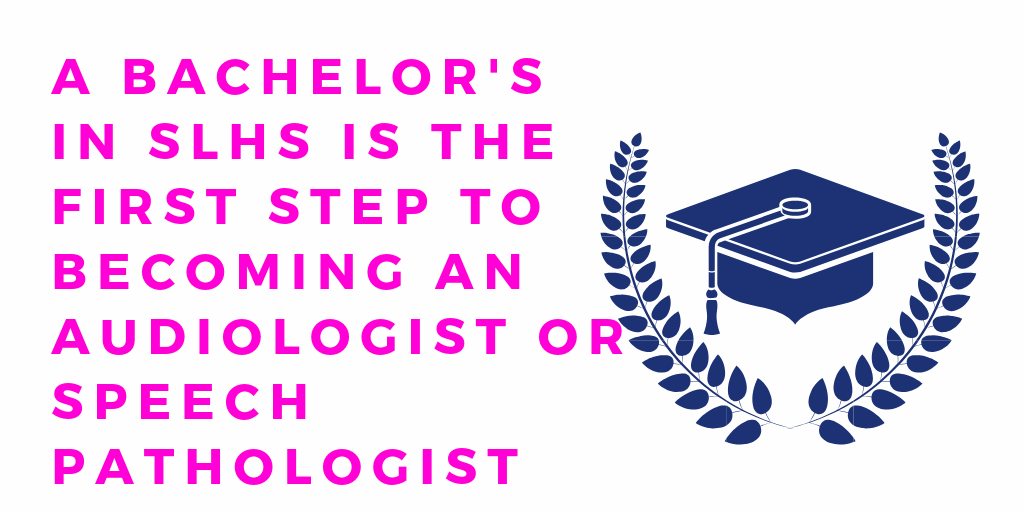
After earning a bachelor’s in speech, language & hearing sciences, most students go on to earn advanced degrees in order to become either audiologists or speech pathologists. Those who don’t continue down either path usually but their training in human service and communication to work in fields like education and health support. Job titles for those with a bachelor’s in speech, language & hearing science include:
- applied behavior analysis (ABA) line tech
- speech therapy assistant
- activity coordinator
- classroom assistant
- volunteer coordinator
- laboratory manager
- respite care worker
How do I Become a Speech Pathologist?
Many people practicing as speech pathologists got their start with a bachelor’s in speech, language, and hearing science. This degree provides a strong base of knowledge about the field and the areas of knowledge required for speech pathology (including program prerequisites). Other speech pathologists hold bachelor’s degrees in related fields like linguistics, psychology, or neurology. But you don’t necessarily need a bachelor’s in speech, language, and hearing science to become a speech pathologist- any bachelor’s degree is acceptable, though you’ll need certain prerequisites under your belt. Prerequisites typically include statistics, biology, physical science, and social and behavioral science. Knowledge of another language, especially American Sign Language, and experience working with clinical populations can also prepare you for your required master’s program.
All states require a masters degree in Speech Language Pathology or Communication Sciences Disorders in order to work as a speech therapist. A master’s in Speech Language Pathology or Communication Sciences is a two-year professional degree which usually incorporates both classroom learning and clinical experience. Courses usually include:
- speech and language development
- alternative communication methods
- age-specific speech disorders
- swallowing disorders
Many schools that offer these degrees even operate on-campus clinics that offer evaluation and treatment for those with communication disorders and differences, where students working to become speech pathologists can gain hands-on experience. Other schools focus on placing students in off-site clinical internships. Regardless of the placement site, learning how to practice speech therapy by observing and assisting professionals in action is an essential part of any Speech Language Pathology or Communication Sciences Disorders master’s program. As with an undergraduate degree in Speech, Language, and Hearing Sciences, it’s essential to find a master’s degree program that’s accredited by the American Speech-Language-Hearing Association.
After earning a master’s you’ll need to gain state licensure. Requirements vary from state to state, but most require a clinical fellowship lasting 36 weeks (1,260 hours). In a clinical fellowship, you’ll work with patients under the supervision and guidance of a licensed speech-language pathologist. You’ll also have to pass the Praxis II: Subject Assessment in Speech-Language Pathology, a national exam administered by Educational Testing Service’s (ETS). You can then apply for licensure in the state where you plan to practice. Many professionals also opt to earn a national certification in speech therapy. With the American Speech-Language-Hearing Association’s (AHSA) Speech-Language Pathology Certificate of Clinical Competence (CCC-SLP) under your belt, you’ll have more opportunities for advancement based on your demonstrated expertise. The requirements for this credential are roughly the same as the licensure requirements for most states, and certification must be renewed every three years through by completing 30 documented professional development hours.
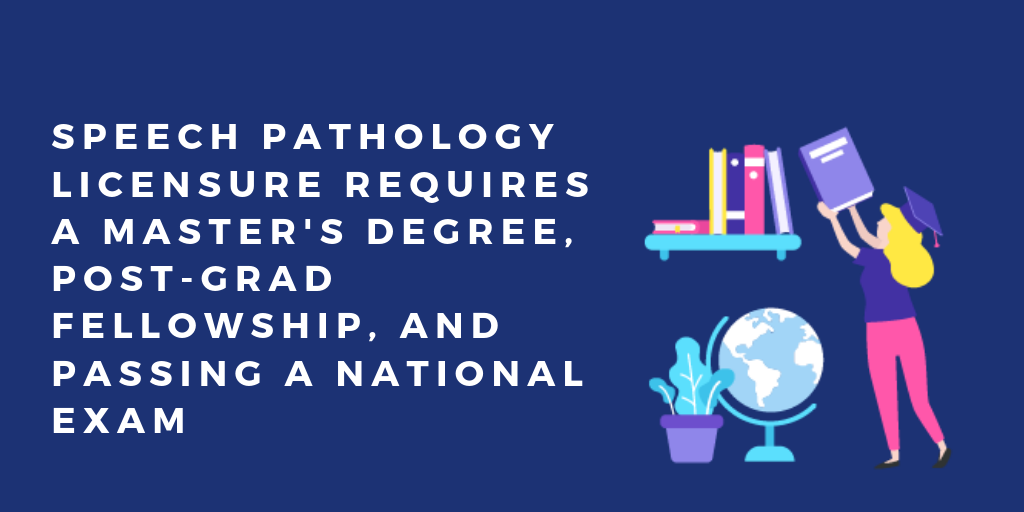
How do I Become an Audiologist?
To become an audiologist, you’ll need to earn a doctoral degree in audiology (AuD), as well as state licensure. Unlike most doctoral programs, an AuD does not require a master’s degree for entrance; a bachelor’s in speech, language and hearing sciences is sufficient. A bachelor’s in a related field is also acceptable for most programs, but a bachelor’s in speech, language, and hearing sciences has the advantage of including many of the prerequisites for a doctoral degree in audiology program. An AuD covers coursework in physiology, physics, anatomy, pharmacology, diagnosis and treatment, genetics, ethics, and normal and abnormal communication development. In addition to classwork, you’ll also complete hands-on experiential training under the supervision of a licensed audiologist through a practicum, internship, or externship. To qualify for licensure, you’ll need to seek out an audiology doctoral degree program that has been accredited by the Audiology and Speech-Language Pathology Council on Academic Accreditation.
After earning a doctorate in audiology, you’ll need to gain state-level licensure. Each state has its own requirements, but most require 300-375 hours of supervised clinical practice, nine months of post-grad professional clinical practice, and a passing score on the Praxis Examination in Audiology. Many audiologists also opt to earn a Certificate of Clinical Competence in Audiology (CCC-A), which is offered by the American Speech-Language-Hearing Association, or become credentialed by the American Board of Audiology. These extra credentials can open the door to more advanced professional opportunities.
Can I Earn a Degree in Speech, Language, and Hearing Sciences Online?
There are a few schools that offer online undergraduate degrees in Communication Sciences and Disorders or Speech, Language, and Hearing Sciences. In one respect, an online degree is actually well-suited for training in speech pathology; many speech pathologists actually deliver services to clients online, a delivery method known as telepractice. According to the ASHA, clinical research has shown that patient outcomes from telepractice are as high as those delivered in person. Learning about communication disorders online can be a good foundation for practicing online professionally. On the other hand, online classes in Communication Sciences and Disorders can’t offer the same hands-on experience, including in-person observation and feedback, that an on-campus class can provide. Students who want a more applied learning experience can look for an online Speech, Language, and Hearing Sciences degree program that includes an outside internship component.
How Much Can I Earn with a Degree in Speech, Language, and Hearing Sciences?
Most people with a degree in Communication Sciences and Disorders go on to become audiologists or speech language pathologists, both well-paid careers. According to the Bureau of Labor statistics, Audiologists earned an average salary of $75,920 for 2018. The highest-paid 10% made an average of $117,910. Those working in hospitals had the highest overall salaries, averaging $83,120.
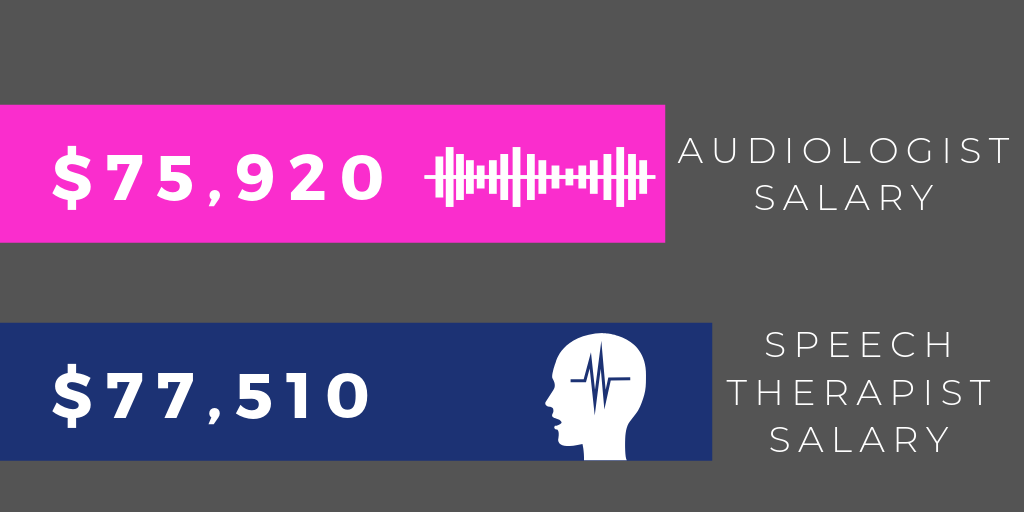
Speech pathologists earn even higher salaries. The average salary for speech therapy in 2018 was $77,510. The top 10% of speech pathologists made over $120,060. Of the most popular work settings, speech therapists working in nursing and residential care facilities made the highest salaries- $94,680 on average.
What is the Job Market for a Degree in Speech, Language, and Hearing Science?
The entire healthcare sector is booming, and the allied health professions are no exception. In addition to great salaries, you can expect a strong job market with a degree in Communication Sciences and Disorders and licensure as an audiologist or speech pathologist. The Bureau of Labor Statistics projects a 17.8% growth in employment for speech-language pathologists between 2016 and 2026, with an estimated 25,900 jobs expected to open up. The market for audiology is expected to grow 21% in the same period. Since audiology is a much smaller field overall, this will mean 3,100 new jobs will be created.
An article in AMN Healthcare entitled What’s Driving the Demand for Speech-Language Pathologists?” has noted that improved survival among both older adults and premature infants has increased the number of people who experience disorders related to speech and swallowing. Older adults are especially vulnerable to conditions like Parkinson’s and stroke that can affect speech, while premature infants often need help to learn to swallow properly. The number of qualified speech language pathologists has not kept pace with the rising demand for these services, resulting in the projected high demand for credentialed professionals in the field.
Is a Degree in Speech, Language, and Hearing Sciences Right for Me?
If you want to pursue a career in treating communication disorders, you’ll need to have a passion for understanding people (in the most literal sense) and for helping them express themselves. You’ll need to have the technical savvy to understand treatment techniques as well as “people-skills” like patience and cultural sensitivity. Because these jobs require flexibility and close, hands-on work with different people, jobs in audiology and speech therapy are good careers for extraverts. Some of the character traits and skills associated with success in the field of communication sciences and disorders include:
- Collaboration
- Teamwork
- Problem Solving
- Oral and Written Communication
- Organization
- Technology Literacy
- Research
- Counseling and Motivating
- Data Collection and Analysis
Further Reading:
- What Can I Do With a Health Care Degree?
- What Degree Do You Need to Be a Speech Therapist?
- What degree do I need to become a Speech Pathologist?
- What degree do I need to be an Audiologist?
- What Degree Do I Need to Be an Optometrist?
- What Associate’s Degrees Are Good for a Career in the Health Care Industry?
- Top 20 In-Demand Healthcare Careers
- What Can I do with a Degree in Medicine?
- What Can I Do With a Linguistics Degree?
- Top 10 Careers for Extroverts
- What Degree do I need to Become an Occupational Therapist?
- 50 Best Online Degrees for 2019
- 23 Fastest Online Bachelor’s Degree Programs
- 20 Best Degree Programs for Undergraduates
- Top 25 Fastest Online Doctorate Degrees
